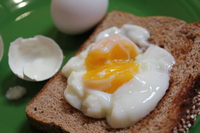
The Perfect Egg — Updated
Breakfast, lunch, or dinner — eggs are quick, satisfying, and nutritious. Here’s a simple way to cook a truly perfect egg, plus a brief science update on why eggs went from “hero → zero → hero” in nutrition headlines.
 Creamy white, warm yolk — simple and perfect.
Creamy white, warm yolk — simple and perfect.
How to Cook the Perfect Egg
Goal: a tender, creamy white with a warm yolk that thickens slightly (not runny, not hard). This takes time and low heat — no rushing.
Option 1: Sous Vide
- Set the water bath to 150°F (65.5°C).
- Lower the egg in its shell; cook at least 70 minutes. Longer won’t overcook.
- Crack, season with salt and pepper, serve.
Option 2: Induction “Sous Vide”
- Using an induction burner with a steel pot, hold the water at 150°F.
- Add the egg in its shell; cook ~70 minutes, same as above.
Option 3: Classic Low-&-Slow Fried Egg
- Use a small nonstick skillet sized to your egg(s). Melt just enough butter to film the pan over the lowest heat possible — no sizzling or foaming.
- Crack the egg into a small saucer first, then slide it gently into the pan (easier to spot/remove any shell fragments). :contentReference[oaicite:0]{index=0}
- Cook 7–10 minutes, patiently, until the white turns opaque and custardy while the yolk warms and thickens.
- Slide onto the plate; season. (The old “butter on top” flourish isn’t needed.) :contentReference[oaicite:1]{index=1}
Mediterranean points: The egg alone is neutral; add whole-wheat toast (+½ point) and a quick pan-warmed tomato (+¼ point). :contentReference[oaicite:2]{index=2}
Eggs: Hero → Zero → Hero (Again)
Earlier nutrition advice focused on dietary cholesterol and pushed eggs to “zero.” Modern evidence and guidance have shifted toward overall dietary patterns. The American Heart Association notes that eggs can fit into a heart-healthy pattern; large pooled analyses likewise find that moderate intake (≈ up to 1 per day) is not associated with higher cardiovascular risk overall, with some Asian cohorts showing lower risk. :contentReference[oaicite:3]{index=3}
So are 2–3 eggs in a day okay? For many generally healthy adults, enjoying 2–3 eggs on a given day within a Mediterranean-style pattern (vegetables, whole grains, olive oil; minimal processed meats) has not been linked with worse outcomes in contemporary evidence syntheses. Personalize if you have diabetes, markedly elevated LDL, or familial hypercholesterolemia. :contentReference[oaicite:4]{index=4}
What changed?
- Hero (then): affordable, complete-protein staple.
- Zero (1990s–2000s): blanket limits on dietary cholesterol pushed eggs off the plate.
- Hero (now): guidelines de-emphasize cholesterol caps; quality of the whole plate matters more (e.g., eggs with greens and olive oil vs. eggs with bacon/butter/pastry). :contentReference[oaicite:5]{index=5}
Nutrition Snapshot (Eggs)
| Portion | Calories | Protein | Total Fat | Sat Fat | Cholesterol |
|---|---|---|---|---|---|
| 2 large eggs | ~140 kcal | ~12.6 g | ~10 g | ~3.2 g | ~372 mg |
| 3 large eggs | ~210 kcal | ~18.9 g | ~15 g | ~4.8 g | ~558 mg |
Values are approximate per standard large eggs; cooking fat and sides change totals.
Notes & Sources
- AHA Science Advisory (2020): literature does not generally support significant associations of egg intake with CVD; emphasize dietary patterns.
- Dietary Guidance Statement (AHA, 2021): shift from single nutrients to overall patterns.
- Prospective cohorts + updated meta-analysis (2020): moderate egg consumption ≈ up to 1/day not associated with higher CVD risk overall; possibly lower risk in Asian cohorts.
- Heart (2018, China Kadoorie Biobank): up to <1 egg/day associated with lower CVD/stroke risk.
